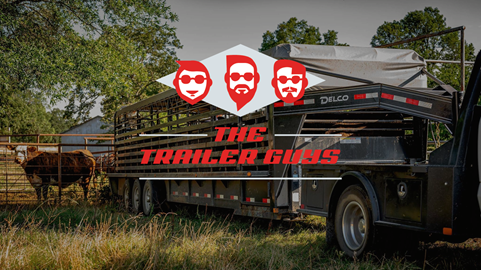When selecting the right trailer, understanding the Gross Vehicle Weight Rating (GVWR) is crucial. Whether you’re hauling equipment, materials, or livestock, knowing your trailer’s GVWR ensures safe and legal towing. So, what exactly is GVWR, and why should you care? Let’s dive in and explore.
What Is GVWR?
GVWR, or Gross Vehicle Weight Rating, refers to the maximum weight a trailer can safely carry, including its own weight, cargo, and any modifications or additional features. In essence, GVWR represents the total load your trailer can handle without compromising its safety or performance.
How Is GVWR Calculated?
The manufacturer determines the GVWR based on a few key factors:
- Frame Strength: The trailer’s frame must be strong enough to support the combined weight of the trailer and its load without damaging the structure.
- Axle Rating: The axles must be capable of bearing the weight of the trailer and its cargo safely.
- Tires: The tires must be rated to support the full weight of the trailer and its load.
- Braking System: The trailer’s brakes must be capable of stopping the trailer safely, even when fully loaded.
For instance, if your trailer has a GVWR of 10,000 lbs., the combined weight of the trailer, its load, and any added equipment should not exceed that limit.
Why GVWR Matters: Safety and Compliance
- Preventing Overloading: Exceeding the GVWR can lead to dangerous consequences, such as axle, tire, or frame damage. Overloading can also cause instability, increasing the risk of swaying or losing control, which can result in accidents.
- Legal Compliance: Towing a trailer that exceeds its GVWR is not just unsafe—it’s also illegal in many places, and it could lead to fines or penalties. Staying within the GVWR ensures you’re following road regulations.
- Protecting Your Trailer and Vehicle: Overloading doesn’t just affect the trailer—it can damage your towing vehicle as well. By staying within the GVWR, you help protect both your trailer and truck, potentially saving on maintenance costs and extending the life of your equipment.
- Insurance Considerations: If you tow a trailer beyond its GVWR and are involved in an accident, your insurance may not cover the damages. Most insurers will deny claims if they find the trailer was overloaded at the time of the incident.
How to Find Your Trailer’s GVWR
The GVWR is typically listed on a plate or sticker located on the trailer itself. It’s essential to check this rating before you load up and hit the road. Always ensure that the combined weight of the trailer and its cargo stays within the recommended GVWR.
Choosing the Right GVWR for Your Needs
When you’re buying a trailer, choosing one with the right GVWR is critical for your hauling needs. Consider:
- What are you hauling? Whether you’re transporting equipment, materials, or livestock, make sure the trailer’s GVWR is suitable for your typical loads.
- Do you need extra capacity? If you anticipate hauling heavier loads in the future, consider opting for a trailer with a higher GVWR to give you room to grow.
At The Trailer Guys, we offer a wide selection of trailers with varying GVWR ratings, from lightweight utility trailers to heavy-duty dump trailers, ensuring you get the right fit for your hauling needs.
Conclusion
Knowing and understanding GVWR is essential for making safe and informed decisions about your trailer purchase. It not only helps keep you in compliance with the law, but also protects your trailer and towing vehicle. Before you tow, always check your trailer’s GVWR to ensure you’re within the limits.
If you need help selecting the right trailer or have any questions about GVWR, contact The Trailer Guys today. Our team is here to help you find the perfect trailer for your hauling needs!



